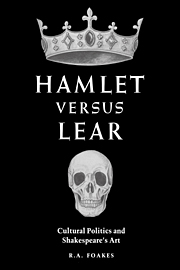1 - Introduction: Hamlet versus King Lear
Published online by Cambridge University Press: 14 August 2009
Summary
Let me begin with two lists, so as to provide an orientation for the first part of this book. One is a short anthology of comments praising either Hamlet or King Lear as the best, the greatest, or the chief masterpiece of Shakespeare. The claims for Hamlet pretty much died out by the 1950s, while those for King Lear become commonplace only from the 1950s onwards, though notably anticipated by Hazlitt and A. C. Bradley. The second list records some of the major international events in the period 1956–65, which is when the great shift in the status of King Lear took place. I do not claim that there is a direct connection, or that what was happening politically in the world at that time explains the way Shakespeare's plays were assessed, but only that critics consciously or unconsciously reflect the mood of their time; and the mood of that period was dominated by the expansion of nuclear arsenals and the fear of a war that might destroy the world. This mood was indicated in two of the films that made a huge impact, Stanley Kramer's On the Beach (1959), a film about the end of civilization in a world devasted by atomic waste, based on a 1957 novel by Nevil Shute; and Stanley Kubrick's Dr Strangelove: or, How I learned to Stop Worrying and Love the Bomb (1963), a satirical reflection of the nightmares of the age.
Information
- Type
- Chapter
- Information
- Hamlet versus LearCultural Politics and Shakespeare's Art, pp. 1 - 11Publisher: Cambridge University PressPrint publication year: 1993
